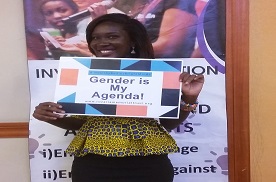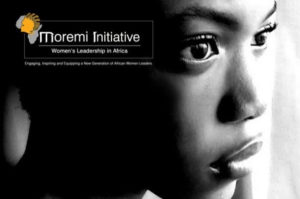I was honoured to represent the Moremi Initiative for women’s leadership in Africa at the 31st GIMAC conference in Addis, Ethiopia from the 20th and 21st of January 2018 at the UNECA. The GIMAC conference was preceded by the
Young Women and Girls Advocacy Training on the 19th January, 2018 at the Jupiter International Hotel.
My greatest highlights were the mentoring sessions from Madam Nyaradzayi(ED, Rozaria Memorial Trust and the AU special Envoy on Child marriage), Madam Benita Diop( AU special Envoy on Women, Peace and Security), Madam Hendrina Doroba(ED, FAWE and GIMAC Chair), and Dr Amany Asfour (President, Egyptian Business women’s Association). And also the meeting with the gender minister of DRC, who is the vice chair of the sectorial technical committee on gender for our thoughts and opinions on corruptions and how it affects us as young women. Beyond getting to be in these spaces I was especially excited to see a lot of young people partaking in every aspect of the conference. I was also happy and proud of myself for volunteering to present the youth resolution on sexual and reproductive health rights (SRHR) of young girls and women. 19year old Thandiwe’s real life experience with child marriage, teenage pregnancy and re entry back to school was also one of hope and reflections for me.
 Along with the highs came learning moments as well. A lot of technical issues were discussed but my three big takeaways were; first, the issues of girl education , particularly how friendly school reentry policy for girls who drop out of school due to teenage pregnancy will embolden them to be able to go back to school and ensure they stay . The issue of teenage pregnancy leads to my next take away from the conference which is making SRHR education more accessible to girls and making sure that in countries where abortion is legal under certain circumstances, health workers are not allowed to make it illegal based on their personal beliefs and putting the lives of many at risk. Another intruiging learning point was that in the fight for recognizing women’s unpaid care work by governments, it was important to bring to light that keeping relatives at home as house maids and helps without due compensation contributes to not recognizing women’s unpaid care work and needed to be addressed in the bid to recognize women’s unpaid care work.
Along with the highs came learning moments as well. A lot of technical issues were discussed but my three big takeaways were; first, the issues of girl education , particularly how friendly school reentry policy for girls who drop out of school due to teenage pregnancy will embolden them to be able to go back to school and ensure they stay . The issue of teenage pregnancy leads to my next take away from the conference which is making SRHR education more accessible to girls and making sure that in countries where abortion is legal under certain circumstances, health workers are not allowed to make it illegal based on their personal beliefs and putting the lives of many at risk. Another intruiging learning point was that in the fight for recognizing women’s unpaid care work by governments, it was important to bring to light that keeping relatives at home as house maids and helps without due compensation contributes to not recognizing women’s unpaid care work and needed to be addressed in the bid to recognize women’s unpaid care work.

Going back home I am intending to apply the knowledge and experiences shared by women working in the education and reproductive health sector. I intend to work to get pregnant girls to stay in school till it’s medically not possible to have them in classrooms that way they don’t miss out a lot on school work. Also as one who has worked in the classroom, to see how the Ghana Education Service can effectively implement its policy on teaching comprehensive sexual and reproductive health education in their classrooms.
I would like to thank the almighty God for seeing me through the conference successfully. I am grateful to the Moremi Initiative for women’s leadership in Africa and Mr. Mawuli Dake for nominating me to attend this important conference. I am also grateful to the Rozaria Memorial trust and Madam Nyaradzayi for giving me the opportunity to be part of the youth delegation to this conference and I am also grateful to the Plan International African Union liaison office for supporting my trio to the conference.



